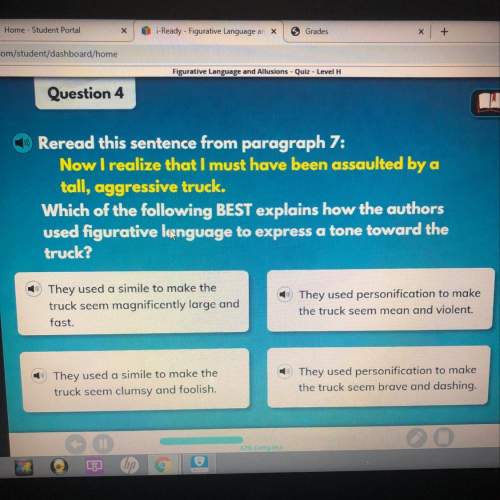Letter to a Citizen of Kentucky, an excerpt
Executive Mansion, Washington,
April 4, 1864...

English, 28.05.2020 02:01 kobrien9146
Letter to a Citizen of Kentucky, an excerpt
Executive Mansion, Washington,
April 4, 1864.
A. G. Hodges, Esq., Frankfort, Ky.
My Dear Sir:
You ask me to put in writing the substance of what I verbally stated the other day, in your presence, to Governor Bramlette and Senator Dixon. It was about as follows:
I am naturally anti-slavery. If slavery is not wrong nothing is wrong. I cannot remember when I did not so think and feel; and yet I have never understood that the Presidency conferred upon me an unrestricted right to act officially in this judgment and feeling. It was in the oath I took that I would to the best of my ability preserve, protect and defend the Constitution of the United States. I could not take the office without taking the oath. Nor was it in my view that I might take the oath to get power, and break the oath in using the power.
I understood, too, that in ordinary civil administration this oath even forbade me to practically indulge my primary abstract judgment on the moral question of slavery. I had publicly declared this many times and in many ways; and I aver that, to this day I have done no official act in mere deference to my abstract judgment and feeling on slavery. I did understand, however, that my oath to preserve the Constitution to the best of my ability imposed upon me the duty of preserving, by every indispensable means, that government, that nation, of which that Constitution was the organic law. Was it possible to lose the nation, and yet preserve the Constitution?
By general law, life and limb must be protected; yet often a limb must be amputated to save a life, but a life is never wisely given to save a limb. I felt that measures, otherwise unconstitutional, might become lawful by becoming indispensable to the preservation of the Constitution through the preservation of the nation. Right or wrong, I assumed this ground, and now avow it. I could not feel that to the best of my ability I had even tried to preserve the Constitution, if, to save slavery, or any minor matter, I should permit the wreck of government, country, and Constitution altogether.
When, early in the war, General Fremont attempted military emancipation, I forbade it, because I did not then think it an indispensable necessity. When, a little later, General Cameron, then Secretary of War, suggested the arming of the blacks, I objected, because I did not yet think it an indispensable necessity. When, still later, General Hunter attempted military emancipation, I forbade it, because I did not yet think the indispensable necessity had come. When, in March and May and July, 1862, I made earnest and successive appeals to the Border States to favor compensated emancipation, I believed the indispensable necessity for military emancipation and arming the blacks would come, unless averted by that measure. They declined the proposition; and I was, in my best judgment, driven to the alternative of either surrendering the Union, and with it the Constitution, or of laying strong hand upon the colored element. I chose the latter. In choosing it, I hoped for greater gain than loss; but of this I was not entirely confident...
Yours truly,
A. Lincoln
Use context to determine the meaning of the words in bold.
(4 points)
Group of answer choices
I made a few angry gestures.
I made several heartfelt requests.
I made two unenthusiastic attempts.
I made old-fashioned decisions.

Answers: 3


Other questions on the subject: English


English, 22.06.2019 01:00, nathanowens121224
Which verb or verb phrase signals an inappropriate shift in mood. a) will you let b) should first change c) must attend d) will be served
Answers: 1

English, 22.06.2019 14:50, gray4675
Apexleaming. com/public/activity/1/4/3/assessmen tl143 test (cst). drama shakespeare's macbethread these lines from the playlady m. out, spot out, i say! --one: iwo: why, then'tis time to dot.- is murky! , my lord, fiel a soldier, and afеard? what need we fear who knows it, when nonecan call our power to account? - yet who would havethought the old man to have had so much in him? how does this passage add tension to the playo a macbeth knows that lady macbeth knows he has seen a ghostb. the audience knows that lady macbeth is unhappy in hermamage before macbeth knows this informationoc. macbeth knows that lady macbeth thinks they should moredeodle tohcether secretd. the audience knows that lady macbeth is losing her mind andconceng before macbet xrows this information
Answers: 2
You know the right answer?
Questions in other subjects:





Mathematics, 11.10.2020 16:01

Mathematics, 11.10.2020 16:01


Mathematics, 11.10.2020 16:01

English, 11.10.2020 16:01

Mathematics, 11.10.2020 16:01




